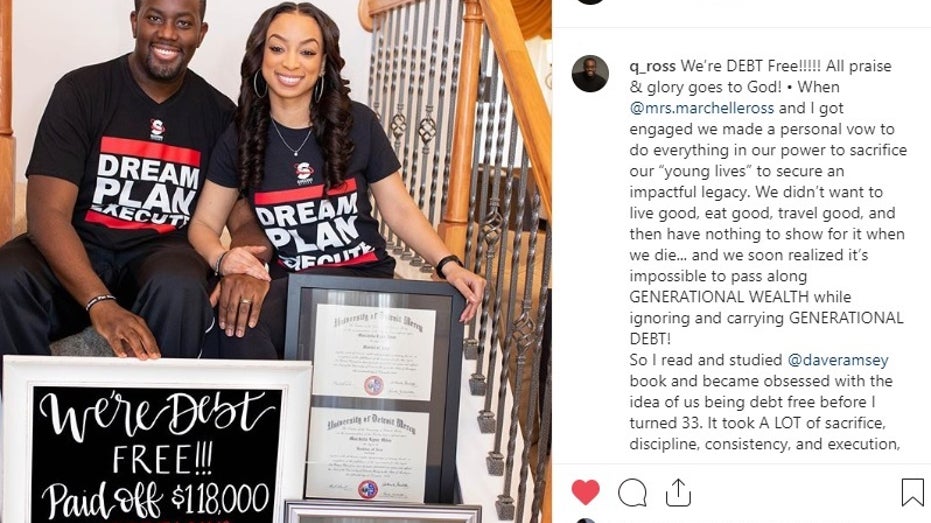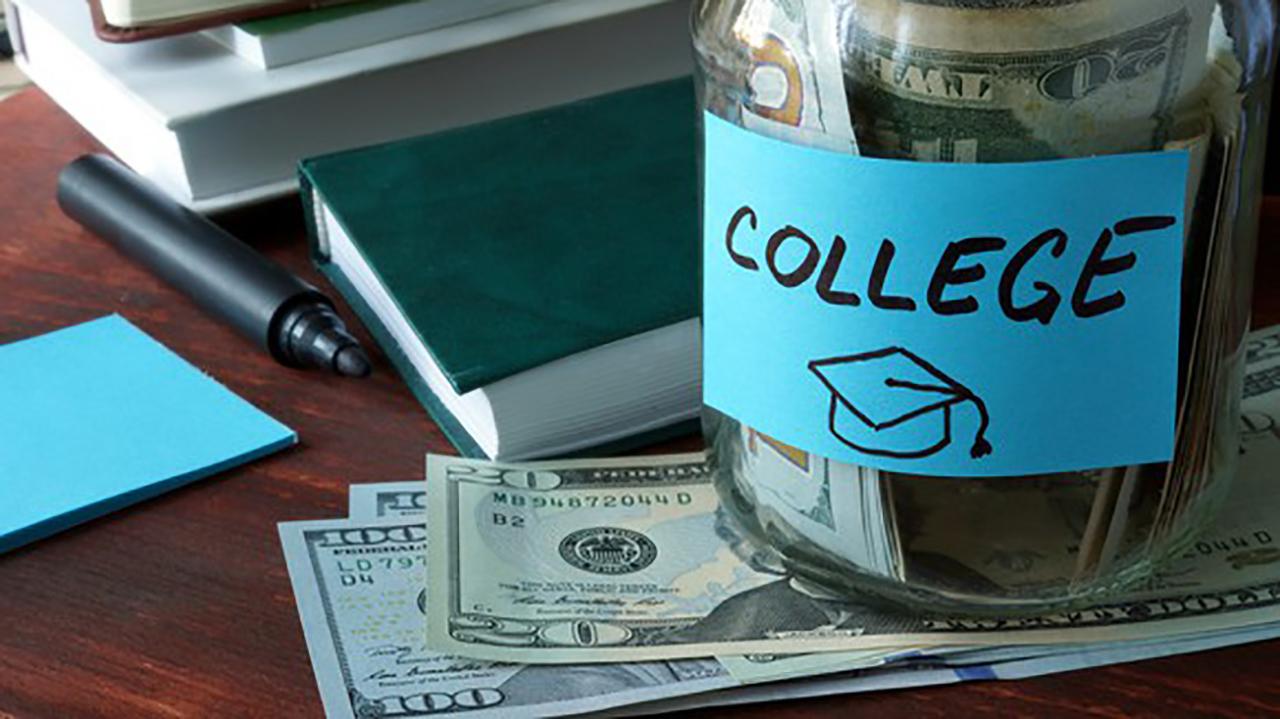‘It all boiled down to freedom’: How a Michigan couple paid off $120,000 in student loans in less than 3 years
Quenton and Marchelle Ross thought they would never pay off their debt.
After college, their student loans came up to nearly $120,000 — three-and-a-half times the national average for college grads in their 30s, and five times that of grads in their 20s.
Still, they were determined to try.
The couple, originally from Detroit, decided to stay local for school. Quenton, now 33, double majored in telecommunications and criminal justice at Michigan State University. And Marchelle, 28, took up secondary education at the University of Detroit, Mercy, where she got her bachelor’s before earning her master’s in educational administration.
When Quenton graduated in 2008, his loans totaled around $40,000 before interest. When Marchelle graduated in 2016, her undergrad and post-grad loans were about $77,000.
Together, they owed roughly $118,000. And while they both received scholarships in high school that went toward their college education, it didn’t make much of a dent in the debt.
“I never really heard about [people paying off their student loans] too much,” Quenton told Fox Business. “My mom had loans for, like, 20 years after she graduated. It was just kind of something that you assumed would always linger around and never go away.
“So that's kind of how I looked at it.”

Quenton and Marchelle Ross paid off nearly $1200,000 in student loan debt in less than 3 years.
That’s until the couple, who got married in 2015, decided to try and beat the odds.
“It all boiled down to freedom,” Quenton said. “I didn't want to work my entire life … and always have to pay bills. I wanted to get to a point to where I was able to live freely and comfortably and not say, ‘I have to work a full-time job when I'm 60, 70 years old.’
“That was our driving force. It wasn't just the debt. It was really a bigger factor for us.”
Marchelle agreed: “We talked about a lot of very serious things in our relationship so that we were on the same page,” she told Fox Business. “We were very clear on what we wanted: We wanted to sacrifice young so we could enjoy life when we got older.”
It wasn’t until after school, though, that they started paying back. And not all at once, either.
“I always paid the minimum balance because I was conscious of maintaining good credit,” Quenton said, “but I didn't really know how interest worked.” Plus, a lot of the advice he got from advisors and peers was to apply for deferment and stay on for as long as possible.
That’s what he did, unaware that interest began accruing immediately after graduation with rates as high as 7% or more on Plus loans, according to the U.S. Treasury.
CLICK HERE TO READ MORE ON FOX BUSINESS
Marchelle paid back a bit during undergrad, but “it was just the minimum,” she said, and due to high interest, “my amount was going up, not down. So, I deferred when I went back.
“It was frustrating,” she added. “But we knew this could not go on forever.”
The couple leaned on some reliable mentors they met during school, and financial expert Dave Ramsey’s “The Total Money Makeover,” a book that “changed our mentality on how paying the debt was possible,” Quenton said.
They implemented the snowball method, where they paid the smallest loan first, then moved on to the next largest one after — a strategy used by Danny and Amber Masters, who racked up $600,000 in student loans and paid $200,000 in a year, and Redd Horrocks, a self-employed voiceover artist, who paid $39,000 in debt in 5 years.
With the first check of the month, Quenton said, “we would make sure we had money for mortgage, the utilities, everything else, and then with the second check of the month, we would put toward whatever loan we were focusing on at that time.”
It helped that Quenton owned a business, Q11 Photography, which opened in 2017, and in addition to his full-time job as a director of a production at a broadcasting company, generated a good deal of income. He estimates he was bringing in about $100,000 a year.
Marchelle, who was a teacher at the time, was making around $50,000.
Despite their combined $150,000 income, the couple still took steps to cut back on their expenses and focus on their debt, frequently asking themselves, “What do we spend daily, or weekly, on things we don’t need? What are our shopping habits?" Quenton recalled. “That's something we took a hard look at.
“I didn't even go to the barbershop the entire time,” he said. “I learned to cut my own hair.”
They reevaluated their grocery budget, too, Marchelle added, “like, ‘OK, let’s eat out less and only shop for what we need to cook for the next couple of days instead of buying food that goes to waste. And the money we saved by doing that would … go toward our debt.
As well, she said, “even though I’m a social person, I would say, ‘Why don't you come to my house and I can cook as opposed to going out and paying exponentially more. Let's get something that costs $4 versus $25."
In 29 months, the debt was gone.
Unlike the Ross’, a striking 60% of student debt borrowers don’t expect to pay off their loans until their 40s, according to research from Citizens Financial Group.
And while the couple was able to erase their debt, they acknowledge it wasn’t easy.
“It irritated me the way interest works,” Quenton said. “There would be times where I would make a $300 payment, $400 payment in between regular monthly payments and be expecting a huge difference in the amount we owed. But so much of that extra money was going toward interest and not principle. A lot of times you’d want to say, ‘Man, just skip this. We can take this money and put it toward something that could breed immediate results.’”

But they kept at it, and now that their debt is gone, they want to focus on more important things, like taking vacations together, donating to charity, buying property and funding the photography business. Plus, Quenton said, “I can finally go to the barbershop.”
Above all, though, they wanted to be able to start a family.
“Our main goal was not to birth a child into debt,” Quenton said. “So, whenever we have a baby … they won't be adding to an insurmountable debt they had nothing to do with."
"Now we can stick our chests out as husband and wife say we can do that,” Marchelle added, "and God gets the glory. We worked hard but we couldn't have done it without faith."
Their advice to those struggling to pay down debt: Do the work.
“We tell everybody that there are no shortcuts,” Quenton said. “We don't want you to have a 5-minute conversation with us and then think you have some master plan. Read the books, study, learn the nuances of interest and paying debt. Talking to us, you'll find out what works for us. But by doing the work, you'll find out what will work for you.
“When I think about the value of college,” he added, “I tell people that a degree doesn't prove you learned a lot in class, instead, it shows that you were able to matriculate through a structured system for four years, while having the freedom to do whatever you wanted.”
And paying off debt is almost the same: “You have to commit to the process while having the freedom to spend your money on other things. You have to read on your own, study on your own and understand that everything matters. Even the small payments you think are irrelevant are needed and will be applied toward reaching your end goal.”
